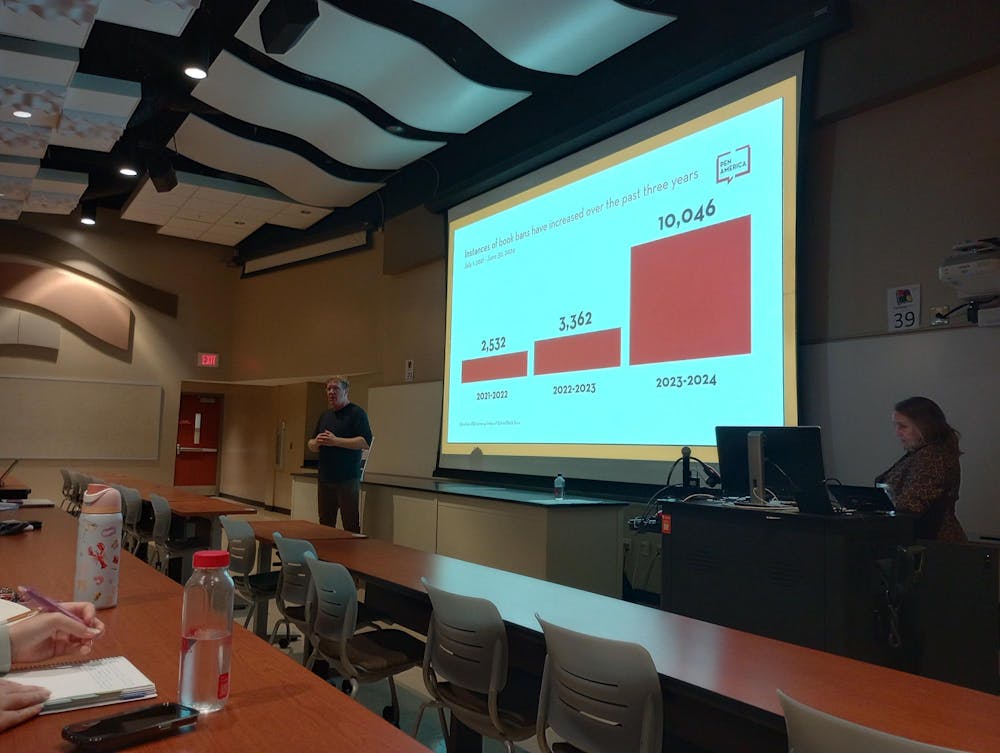Author Brendan Kiely was invited to speak at Miami University in Kreger Hall about his experiences with young adult storytelling on Oct. 15 as a part of the Western College Legacy Seminars series. He opened up about his writing process and what issue-relevant literature can achieve in this digitalized, modern age.
Kiely grew up in Boston in the ’80s and graduated from Miami almost 30 years ago. He began his talk by sharing a short anecdote about him sandwiched between two of his high school crushes, a weaving vehicle and a stomach full of grape juice. Needless to say, it was an embarrassing and memorable experience that stuck with him while writing his first novel.
“The Gospel of Winter,” released in 2014, was a decade in the making, sparked by Kiely’s own experience witnessing the 2002 Boston Archdiocese sexual abuse scandal. Its subsequent exposure by The Boston Globe broke the city – and later the world – apart, after the cover-ups were revealed as a systematic issue within the Catholic church.
But most devastatingly, he saw it personally.
“Even in my own family, people would say things like, ‘I’m never walking into that building again, forget going to church ever again,’” Kiely said, “and there were other folks who would say, ‘Now was the time to double down on our faith.’ And I loved people who were saying two competing things.”
Through a dark period, he was inspired by the duality in his community and started penning the book while a high school teacher in New York.
Before it was officially out, Kiely said the “second smartest thing he’s ever done” was getting his grandmother an advanced copy of the book. As the matriarch of an Irish Catholic family, Kiely had his expectations of what she would think.
But, she had this to say instead: “Brendan, your book reminds me of Solomon asking God for a listening heart.”
That struck me, and it clearly impacted him too, as the recurring motif and the title of the lecture was “Literature with a Listening Heart.”
Kiely continued with his 2015 collaboration with Jason Reynolds on the critically acclaimed – and in some circles, equally controversial – novel “All American Boys.” This came about when he was paired with Reynolds on a book tour, who was also promoting his first novel, “When I Was the Greatest,” at the time. They became great friends, but that was only possible because of the tough conversations they had along the way.
Kiely compared their experiences to what was exemplified in Martin Luther King Jr.'s “The Other America” speech, the concept of “two Americas:” one America defined through the often-exploited Black experience and the other through white privilege. He focused specifically on systematic white privilege, a concept he would later expand on in his 2021 nonfiction book “The Other Talk: Reckoning with Our White Privilege,” for which Reynolds wrote the foreword.
They would incorporate this into their tour and open up conversations in predominantly Black schools regarding police brutality with officers in the audience. According to Kiely, Reynolds’ mother warned him of being in the public eye after the tragic death of Trayvon Martin. And although both authors had cops in their families, how they were treated and interacted with them couldn’t be more different.
Enjoy what you're reading?
Signup for our newsletter
“Race is a social construct, but it’s also a social fact,” Kiely said.
Though race is not solely based on biology, it continues to influence a person’s life as if it were one and not simply an isolated concept.
“Tradition,” released in 2018, is Kiely’s latest fictional novel. It heavily covers rape culture through the slick setting of a prestigious boarding school, which harbors its own sinister traditions towards its female students. Up to this point, Kiely discussed the moment he realized these systems of abuse, through the church, police and toxic masculinity, were all structured in similar ways. But he also had hope that encouraged him to keep writing about these issues, for the possibility that institutions can learn from feedback.
But most of the time, institutions suppress ideas through literature. According to the American Library Association (ALA), “All American Boys” was the third-most challenged book of 2020 and was deemed “too much of a sensitive matter right now.” But that begs the question, is there ever a right time?
In the last three years, book banning has become increasingly normalized. From 2021-2022, there were 2,532 instances, and 3,362 the next year. From 2023-2024, there were 10,046 instances of book bans across 29 states and 220 public school districts.
There is a clear political and social shift occurring in our country right now, and it's affecting how we educate our children and what they grow up to believe.
During my sophomore year of high school, I was on the verge of giving up on my education. I felt like I reached the end of my resources; there was no one to push me harder or encourage me to incorporate my own experiences in my work.
But I will never forget my honors English teacher, Ms. Gleason, for helping me realize it doesn’t have to be that way. In spring 2023, she assigned my class to read, “When I Was the Greatest.” She told us the book was going to make us uncomfortable, but we were going to read it all.
After the climax, the class sat in silence for a couple minutes, mostly shocked that the book would go there. We were used to easy solutions and books that tied themselves in a neat bow, which was not reality. At the end of the semester, our journals were full and conversations were a little more open.
A significant portion of our school was non-white too, so for the first time, it was like we were given permission to recognize that, all for the better. As a teacher himself, I’m sure Kiely witnessed that happen in his own classes, when education exceeded showing up, and listening went beyond using our ears. It’s something I can only strive for in my writing; to try and represent the lived experiences of myself and others in a truly authentic way.
And yet, I’m still that little kid picking up a young adult book, surprised there’s someone who looks like me on the cover.
Maureen Wilson is a first-year student majoring in English literature and minoring in creative writing. She is an opinion writer for The Miami Student and a senior staff writer at the Miami Regional Pulse News. She’s involved in MU Kababayan and Bridges Scholars, and she enjoys watching films in her free time.




